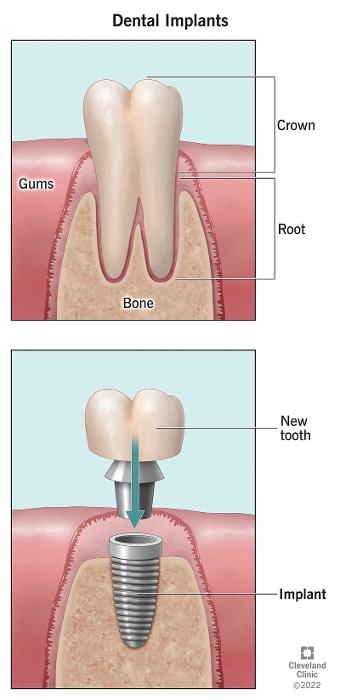
Dental Implants
Dental implants are a long-term solution to tooth loss and are the replacement that dentists most often recommend with good reason!
Unlike dentures or partials, you won’t experience problems with slipping or sliding, and implants don’t require a specialized daily care routine beyond regular brushing and flossing. We do not need to alter existing, healthy teeth with dental implants; in fact, we can support a dental bridge with implants for fewer adjustments during a more complex restoration.
Do I Need Dental Implants?
For many people, missing teeth present a mostly cosmetic problem, which is a legitimate concern: Missing teeth carry a stigma, and people with missing teeth may find themselves unfairly judged in many social settings.
Unfortunately, the problem of missing teeth goes beyond cosmetic. Missing teeth put additional stress on your remaining teeth, leading to damage such as fractures and even further tooth loss. When you have tooth loss, you may find it difficult or even painful to enjoy the fresh, healthy foods you need for proper nutrition and nourishment.
Even more concerning, one or more missing teeth can eventually lead to significant bone loss in your jaw as the bone atrophies from lack of use. Over time, jawbone loss leads to visible changes in your face and causes a prematurely aged appearance.
Dental implants will stop bone loss in its tracks, which even dentures and partials cannot do.
Am I a Good Candidate for Dental Implants?
While most healthy adults are eligible for tooth implants, some health conditions can affect placement results.
When you visit our office to discuss dental implants, we will ask you several questions about your health history. These questions are essential to help us determine whether dental implants are the right option for you. Don’t worry—even if you have a health concern, we can likely work with you. We need to know about any conditions to account for them and take the necessary precautions.
The Implant Process
Implants are a great way to restore missing teeth in your mouth. The implant is placed directly into the jaw, allowing the implant to look and function much like the natural tooth that it replaces.
Step 1: Preparation
Schedule a CBCT scan – this is a special 3D x-ray that shows us the internal bone structure of your jaw. Because the implant needs to be placed in a healthy amount of bone, this step is very important. We partner with a company called Facial Imaging Mobile (800)881-4432. They provide a van that comes to our office or even the patient’s home or work. The scan takes 18 seconds and our office receives the results in 1-2 days. The cost is $379.
Schedule an iTero scan – this is a 3D image of the surface structure of the gums and teeth. This scan uses a camera wand and takes about 5-10 minutes. There is no additional cost.
The CBCT scan and iTero scan are needed to make the Surgical Guide. The surgical guide helps the doctor to place the implant in the most ideal position while taking in consideration vital structures. The surgical guide cost is $475/arch (upper OR lower jaw).
in the most ideal position while taking in consideration vital structures. The surgical guide cost is $475/arch (upper OR lower jaw).
Step 2: Surgery
In this step, the implant is surgically placed into the jaw with the help of the surgical guide. The implant is a titanium threaded post that takes the place of a tooth’s root. The surgery usually takes about one hour and pain levels are controlled with local anesthesia and minimal pain medications. Implant surgery usually costs about $2600/tooth before insurance discounts and benefits.
tooth’s root. The surgery usually takes about one hour and pain levels are controlled with local anesthesia and minimal pain medications. Implant surgery usually costs about $2600/tooth before insurance discounts and benefits.
Healing generally takes about 4-6 months. Sometimes the dentist decides to cover the implant with gum tissue. In this case, a second stage surgery will be performed to uncover the implant before the final restoration. This is generally a short procedure.
Step 3: Restoration
When the patient comes in for the final restoration, we will do an iTero 3D scan of the healed implant site. This information is sent to the laboratory to make the crown.
The patient will return in about 2 weeks to have the final crown installed. This process takes about 60 minutes. Implant crowns and their components usually cost $1800/tooth before insurance discounts and benefits.
Frequently Asked Questions
If your dentist recommends scaling and root planing (SRP), it means you have symptoms of gum disease or periodontal disease. Dental deep cleaning is necessary to stop the damaging effects of this disease.
We all have tiny, open spaces between our teeth and gums, which dentists call a sulcus. Bacteria, plaque, and calculus can build up in these areas over time and become problematic if not removed through brushing, flossing, and regular dental cleanings. When this happens, the gums become swollen, the spaces get deeper, and bacteria make their way further and further down into the gums. A healthy sulcus is less than 3 mm deep, while greater depth suggests a problem. Your dentist will check the depth of the area using a special probe.
When bacteria create an infection in the gums, it’s called gingivitis. If it isn’t severe, regular dental cleaning and more rigorous dental hygiene can correct it. If the bacteria reach deep into the gums, an infection can damage the underlying structures, like the tooth root, attached ligaments, and the bone. This is periodontal disease, and it can cause tooth loss and other health problems if it’s not addressed.
Meet Our Dentist:

Dr. Elyce Millery DDS
Dr. Millery grew up in Rockville, Maryland, and received her bachelor's degree in Nutritional Science from the University of Maryland College Park. She worked as a dental assistant before attending dental school. After earning her Doctor of Dental Surgery degree from the University of Maryland School of Dentistry, she relocated to Hanover, Maryland, with her husband and decided to open a private practice in 2018.
In addition to her formal education, Dr. Millery continues to study dentistry. She actively pursues at least 50 hours annually of continuing education in numerous topics, ...
